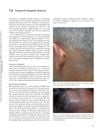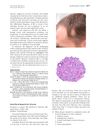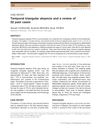 1 citations,
December 1997 in “Journal of The European Academy of Dermatology and Venereology”
1 citations,
December 1997 in “Journal of The European Academy of Dermatology and Venereology” All women with significant unwanted hair growth have hormonal imbalances, often from polycystic ovary syndrome.
 1 citations,
May 1965 in “Medical Clinics of North America”
1 citations,
May 1965 in “Medical Clinics of North America” Hair growth dysfunction involves various conditions with limited treatment options.
 January 2025 in “Clinical Dermatology Review”
January 2025 in “Clinical Dermatology Review” Trichoscopy helps accurately diagnose Netherton syndrome, often mistaken for atopic dermatitis.

Early diagnosis and treatment of hereditary vitamin D-resistant rickets (HVDRR) are crucial to prevent growth issues and other health problems.
December 2023 in “̒Ulūm-i dārūyī” New treatments for excessive hair growth in women, including advanced drugs and nanotechnology, show promise for better results.
 November 2022 in “Journal of the Endocrine Society”
November 2022 in “Journal of the Endocrine Society” A boy with a new NR5A1 gene mutation has a sex development disorder without affecting his adrenal glands.
January 2022 in “Clinical dermatology review” A girl with a rare skin condition called Keratosis Follicularis Spinulosa Decalvans showed no significant improvement with treatment.
 July 2015 in “Hair transplant forum international”
July 2015 in “Hair transplant forum international” Facial hair transplants are generally successful, with hair growth beginning around 3 months post-surgery.
 January 2013 in “Juntendo Medical Journal”
January 2013 in “Juntendo Medical Journal” Understanding the normal hair cycle and different types of hair loss is important for maintaining healthy hair.
 April 2012 in “Encyclopedia of Life Sciences”
April 2012 in “Encyclopedia of Life Sciences” Different genes are linked to various types of hair loss.
 April 2012 in “Informa Healthcare eBooks”
April 2012 in “Informa Healthcare eBooks” Temporal triangular alopecia is a lifelong condition with hairless patches on the side of the head that may be present from birth.

Recent discoveries have improved our understanding of hair loss, but challenges in treatment and knowledge among specialists still exist.

The man has Temporal Triangular Alopecia, a stable, non-scarring hair loss condition best treated with hair transplantation.
 August 2001 in “Veterinary Dermatology”
August 2001 in “Veterinary Dermatology” The meeting presented findings on effective treatments for various pet skin conditions and insights into the immune responses of dogs with atopic dermatitis.
 December 1997 in “Journal of The European Academy of Dermatology and Venereology”
December 1997 in “Journal of The European Academy of Dermatology and Venereology” Most women with excessive hair growth have a hormonal cause.
 10 citations,
September 2019 in “Experimental Eye Research”
10 citations,
September 2019 in “Experimental Eye Research” The enzyme RDH12 plays a role in vision and retinal disease, with mutations leading to early onset visual loss and blindness, but the exact disease mechanism is unclear and there are no treatments yet.
1 citations,
July 2021 in “IntechOpen eBooks” Environmental factors can cause mutations in skin proteins, leading to skin disorders.
 42 citations,
October 2004 in “Experimental and Clinical Endocrinology & Diabetes”
42 citations,
October 2004 in “Experimental and Clinical Endocrinology & Diabetes” The main cause of excessive hair growth in Turkish women is Polycystic ovary syndrome, but in about one fifth of cases, the reason for high male hormone levels is unknown.
 5 citations,
April 2014 in “European Journal of Obstetrics & Gynecology and Reproductive Biology”
5 citations,
April 2014 in “European Journal of Obstetrics & Gynecology and Reproductive Biology” AMH levels can't reliably tell the difference between LOCAH and all types of PCOS in women with excessive hair growth.
12 citations,
January 2000 in “Journal of cutaneous medicine and surgery” Microorganism overgrowth and hyperkeratosis may trigger immune reactions causing lichen planopilaris.
 1 citations,
February 2022 in “Online journal of biological sciences”
1 citations,
February 2022 in “Online journal of biological sciences” The document does not determine if adults with aphallia are fertile.
 January 2022 in “European journal of anatomy”
January 2022 in “European journal of anatomy” A man had four testicles, two of which were outside the scrotum and looked like fatty lumps.
 May 2017 in “InTech eBooks”
May 2017 in “InTech eBooks” Early treatment of children's hair loss, which can be caused by various factors, is important due to its emotional impact.
 16 citations,
March 2005 in “Journal of The American Academy of Dermatology”
16 citations,
March 2005 in “Journal of The American Academy of Dermatology” A boy with Sjogren-Larsson syndrome has skin and muscle symptoms due to a specific enzyme deficiency.
12 citations,
January 2013 in “Indian dermatology online journal” The document reports a unique case of woolly hair with a combination of conditions not previously seen together.
 5 citations,
May 2021 in “BMC surgery”
5 citations,
May 2021 in “BMC surgery” A man's unusual scalp folds caused by a skin condition were treated with surgery and remained unchanged two years later.
 3 citations,
February 2011 in “Journal of Biomedical Research/Journal of biomedical research”
3 citations,
February 2011 in “Journal of Biomedical Research/Journal of biomedical research” A new mutation in the KRT86 gene was found to cause the hair disorder monilethrix in a Han family.
 October 2024 in “Andrology”
October 2024 in “Andrology” Paternal drug exposure can harm fertility, pregnancy outcomes, and offspring health, with specific drugs linked to various reproductive issues.
 68 citations,
August 2012 in “Journal of the American Academy of Dermatology”
68 citations,
August 2012 in “Journal of the American Academy of Dermatology” Dermatoscopy is a useful tool for diagnosing hair disorders and can help choose samples for more detailed analysis.
 56 citations,
March 2010 in “Journal of Dermatology”
56 citations,
March 2010 in “Journal of Dermatology” Most cases of Temporal Triangular Alopecia are found in early childhood and may be related to genetic conditions.

























